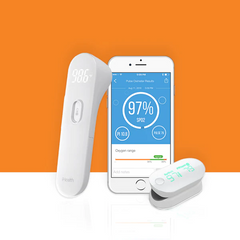Table of Contents |
COVID-19. The most media-covered and widespread virus of the last three years. Are you one of the unlucky 9.5 million people in Australia who caught it? If your symptoms were strong, no doubt you were relieved to finally test negative, rebook your plans and move on with your life. But, have you noticed that some symptoms have just never left? Although you’re now (for the moment) COVID-free, do you feel a little less “sparkly” than before you had it? If you do feel this way, you're probably not going insane or suffering from some kind of COVID paranoia. Long COVID is now affecting millions around the world, with patients and doctors everywhere reporting real long-term changes in those who had the virus. You may have heard the name and wondered, what is long COVID? And what are the symptoms of long COVID? Read on for the answers, as well as what experts are saying about how to treat long COVID.

What is Long COVID?
Long COVID is not a contagious virus in itself, it is the term given to your body’s response beyond the initial illness. In this case, that means experiencing COVID side effects for a prolonged amount of time after testing negative to the disease. Symptoms of COVID-19 can generally take a few weeks to completely clear up completely. So if you’re in your second or third week with a little cough still niggling, you might just be on the tail end of it all. Someone is considered to have long COVID when symptoms persist for 12 weeks or longer after infection.
However, research into coronavirus and its long-term effects is still in its infant stages. In May this year, Australia’s Deputy Chief Medical Officer, Michael Kidd, stated that a case can be considered long COVID when symptoms last more than four weeks. According to Professor Kidd, “long COVID seems to affect between 10 to 30%” of COVID-19 patients. As research continues, it’s not yet known how long symptoms will remain in people suffering with post-COVID conditions. When speaking to WHO, Dr Janet Diaz said that sufferers are describing conditions lasting anywhere from 3 to 9 months - with more light to be shed as time goes on.
Currently, there is no designated test to diagnose long COVID, and people are displaying a wide variety of symptoms that could come from other health problems. This blurs the lines for healthcare providers when trying to confirm if a persisting illness is due to COVID or not. Doctors take into consideration your medical history, your current symptoms and whether or not you have tested positive for COVID in the past. So, what are the symptoms of long COVID? How do you know if you have long COVID?

Long COVID Symptoms
Signs of long COVID can include, but are not limited to:
Digestive Symptoms
- Nausea
- Diarrhoea
- Stomach pain
Heart and Respiratory Symptoms
- Shortness of breath
- Persistent Cough
- Heart Palpitations
- Chest pain
Neurological Symptoms
- Brain fog/difficulty concentrating
- Headaches
- Insomnia
- Changes to taste and smell
- Depression
Other General Symptoms
- Persistent tiredness or fatigue - especially when exerting yourself physically or mentally
- Intermittent fever
- Skin rash
- Changes in menstrual cycles
- Joint or muscle pain
The most reported symptoms of long COVID so far have been shortness of breath, brain fog and fatigue. Of course, these symptoms vary between individuals and can extend beyond this list. Doctors have reported seeing more than 200 different symptoms in patients - all believed to be linked to a previous COVID-19 infection. Even people who experienced little or no signs of COVID when positive have seen long-term symptoms develop. Of course, these things can also occur from pre existing medical conditions. If you feel you could have long COVID, another medical condition or might be dealing with persisting COVID-19 symptoms, consult your medical practitioner. Symptoms of long COVID can be similar to those of influenza. To see the top symptoms of flu in 2022, check out our blog “Be Prepared This Flu Season”.
|
|
iHealth AIR Wireless Fingertip Pulse OximeterLow SpO2 can be a sign of COVID-19. Check your SpO2 levels with a TGA approved pulse oximeter! |
Who is at Risk of Long COVID?
Long COVID can affect anyone who has been previously infected with coronavirus. Again, research is still underway as to who might be more susceptible. So far, groups who appear to be more often developing post-COVID conditions are:
- Adults
- People who suffered severe COVID symptoms, perhaps being hospitalised
- Unvaccinated
- Medically compromised by other health conditions
Children, teens and those who had little or no symptoms appear to be less affected by long COVID, but are not immune to it. While studies are still in early stages, the best way to prevent long COVID is to try and avoid catching, or re-catching COVID-19.
How to Prevent Long Covid
Currently, there is much research to be done surrounding the effects of coronavirus. Health authorities are urging people to take steps to attain the best prevention known so far - not getting infected with COVID-19 in the first place. A US study from the Washington University School of Medicine found that the risk of long COVID increases with the number of reinfections. So, practising those safety measures we are all so used to - mask wearing, hand washing, physical distancing - are still worth it this far down the track. If you do become infected with COVID-19, really look after yourself during this time and seek medical attention as soon as (or before) symptoms start to unravel. While those who don’t end up hospitalised with COVID can still get long term symptoms, they are far less likely to. The main takeaway here - take care of yourself!

How to Treat Long COVID
At present, there is no specific treatment for long COVID - finding a cure depends on first understanding why the disease develops. So until then, patients are encouraged to seek support and treatment for their individual symptoms via their general practitioner and any necessary specialists. To help with this, a number of designated long COVID clinics have recently rolled out across Australia - with more expected. These clinics in NSW, QLD, ACT and SA are already helping many receive the help they need through a multidisciplinary team of practitioners and counsellors.
Long COVID in a Wrap
Along with its “mother”, long COVID is here to stay (until a cure is discovered, that is!) Anyone who has been infected with coronavirus is at risk of developing a post-covid condition. While our understanding of the disease is still minimal, the best preventative so far is not catching COVID at all. Symptoms are varied and sometimes inconclusive for those with other health conditions. For those who are (or suspect they are) dealing with long COVID, support and treatment of symptoms can be achieved with help from your doctor and other practitioners.
|
|
iHealth AIR + iHealth Thermometer BundleSuspect you have COVID-19? Check your symptoms with the TGA approved iHealth AIR Wireless Thermometer and Pulse Oximeter in seconds! |
Resources:


